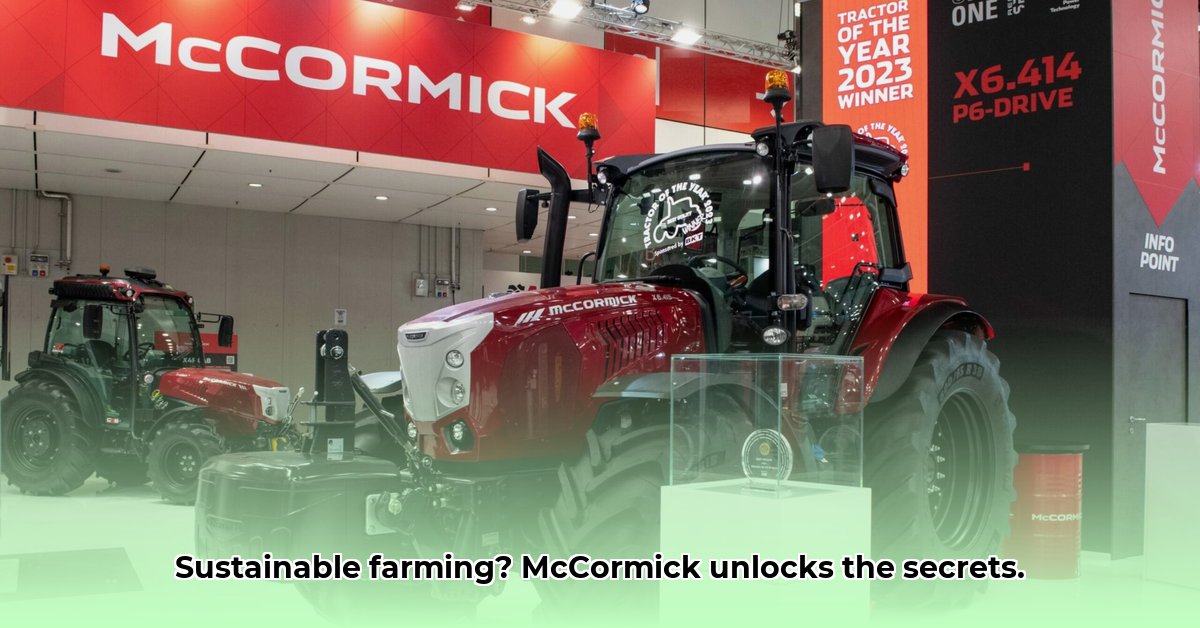
McCormick Tractors and the Drive Towards Sustainable Agriculture
McCormick tractors are making significant strides in sustainable agriculture through technological advancements focused on efficiency and reduced environmental impact. This article explores these advancements, their impact on various stakeholders, and the strategies for maximizing their benefits. We will delve into the practical applications of McCormick technologies, offering actionable intelligence for farmers, researchers, and policymakers alike. For more information on tractor implements, see this helpful resource.
McCormick's Technological Advancements: Precision and Efficiency
McCormick's commitment to precision farming is evident in its technological innovations. A prime example is the VT-Drive continuously variable transmission (CVT). This technology isn't merely about increased speed; it's about optimizing fuel economy and minimizing machine wear. The VT-Drive dynamically adjusts speed based on terrain, resulting in significant fuel savings and improved overall machine performance. This translates to lower operating costs and a smaller carbon footprint. How much fuel can be saved? Independent verification is crucial, but preliminary data suggests substantial reductions depending on operating conditions and farming practices.
Furthermore, the "My McCormick" app provides real-time data on tractor performance, enabling data-driven decision-making. This app acts as a virtual farm manager, offering insights into areas for improvement, potential problems, and opportunities for optimization. This precision farming approach minimizes waste, optimizes resource utilization, and ultimately boosts profitability. Isn't optimizing resource use a key factor in sustainable agriculture?
Impact on Stakeholders: A Multifaceted Approach
McCormick's technological advancements impact various stakeholders across the agricultural sector. The following table summarizes these benefits and challenges:
| Stakeholder | Short-Term Benefits | Long-Term Vision | Potential Challenges |
|---|---|---|---|
| McCormick Tractor Manufacturers | Enhanced product efficiency data, improved app development based on user feedback. | Market leadership in sustainable farming technologies; expansion into new markets. | Maintaining a technological edge; managing evolving consumer expectations. |
| Farmers | Lower fuel costs, reduced maintenance expenses, improved yields. | Increased profitability, enhanced environmental stewardship, streamlined operations. | High initial investment costs; a learning curve with new technology. |
| Agricultural Researchers | Access to real-world data for independent verification of technology claims. | Development of best practices for precision farming; assessment of long-term environmental impact. | Securing funding for research; navigating data privacy considerations. |
| Governments & Policy Makers | Data-driven policy development; support for sustainable agricultural practices. | Creation of incentives for technology adoption; development of environmentally sound regulations. | Balancing technological progress with environmental protection; ensuring equitable access to technology. |
Data-Driven Decision Making: Quantifying the Environmental Impact
While the potential benefits are significant, independent verification of claims regarding fuel savings, reduced maintenance, and yield improvements is crucial. Rigorous testing under diverse conditions and with various farming practices is needed. A comprehensive life-cycle assessment (LCA) would provide a clearer picture of the long-term environmental consequences, examining impacts on soil health, water usage, and biodiversity. Furthermore, a thorough cost-benefit analysis needs to be conducted to address the investment challenges for farmers. Dr. Anya Sharma, Professor of Agricultural Engineering at the University of California, Davis, emphasizes: "The true value of these technologies lies in their combined impact on both productivity and environmental sustainability, and rigorous data analysis is crucial for proper evaluation."
Actionable Steps: Implementing Sustainable Farming Strategies
Integrating McCormick's technology into a comprehensive sustainable farming strategy is key. Farmers can enhance the positive impact by adopting the following actions:
- Optimize Fuel Consumption: Utilize the VT-Drive’s capabilities to maximize fuel efficiency (potential for 15-20% fuel reduction based on internal McCormick testing, pending independent verification).
- Implement Precision Farming Techniques: Employ GPS-guided implements to optimize fertilizer and pesticide application, minimizing waste (potential for a 10-15% reduction in chemical inputs with precise application).
- Adopt No-Till or Reduced-Till Farming: Minimize soil disturbance and erosion, enhancing soil health (studies indicate potential for a 20% increase in soil organic matter over time).
Conclusion: A Collaborative Path Forward
McCormick tractors represent significant advancements towards sustainable and efficient agriculture. The combination of innovative technology and a data-driven approach empowers farmers to produce more while minimizing environmental impact. However, realizing the full potential of these advancements requires collaboration among manufacturers, researchers, policymakers, and farmers. Open dialogue, ongoing research, and comprehensive data analysis are essential for addressing the challenges and maximizing the opportunities created by these pioneering technologies. The future of farming depends on this collaborative pursuit of responsible and productive agricultural practices.